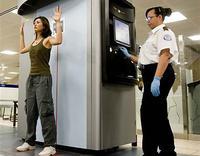-
DHS offers new guidance for when to dismiss immigration cases
On Thursday, DHS issued guidelines to federal officials, advising that they should consider dismissing pending immigration cases involving some groups of illegal immigrants, among them children, college students, the elderly, and victims of domestic violence.
-
-
U.S. recession drives Mexican immigration to record lows
With the U.S. economy in a tail spin and violent Mexican drug cartels raging out of control, immigration from Mexico into the United States has fallen to all-time lows; Mexican census figures show that net migration is close to zero with few Mexicans immigrating to the United States and many returning home
-
-
Sector Report for Thursday, 17 November 2011: Border / Immigration control
This report contains the following stories.
Plus 1 additional story.
-
-
Alabama lawmakers backpedal on tough immigration law
Republican senators in Alabama are currently working on a series of amendments that would ameliorate the tough immigration law that has sharply divided the state
-
-
Returning vets and military tech could be deployed to border
Veterans returning from the wars in Iraq and Afghanistan could be heading to the U.S.-Mexico border next; seeking to take advantage of the military technology and personnel returning from the ongoing conflicts in the Middle East, federal border officials are considering a plan to use these newly freed resources
-
-
Major drug tunnel discovered, 14 tons of marijuana seized
On Tuesday customs officials discovered a major drug tunnel below the U.S.-Mexico border which led to the seizure of fourteen tons of marijuana
-
-
Congressman says Obama's immigration strategy a “backdoor amnesty policy"
Congressman Michael McCaul (R-Texas) recently spoke with Homeland Security NewsWire’s Executive Editor Eugene K. Chow; in the interview Representative McCaul offered his views on President Obama’s current administration strategy, cost-effective strategies to secure the border, and ways DHS could improve Secure Communities; McCaul: “Technology working in concert with boots on the ground is the key to securing the border… [Border Patrol] agents need the benefit of Unmanned Aerial Vehicles and infrared sensor technology to conduct surveillance, and then the resources to quickly pursue what is found”
-
-
EU to allow full-body scanners at airports

In response to the continued threat of terrorism, the European Union (EU) recently passed legislation that would formally European airports to use full-body scanners; prior to Monday’s announcement, trial usage of full-scanners was limited to a period of thirty months; under the new rules, member states will have the option for unlimited deployment of the scanners, but will not be required to use them
-
-
Internal e-mails reveal FBI confused by Secure Communities

Recently released government e-mails indicate that the FBI had strong doubts about Secure Communities, a controversial DHS immigration program; officials worried that the misunderstanding over whether or not cities and states could actually opt out of the program would lead to a rift between local and federal law enforcement agencies
-
-
GAO hammers CBP over border surveillance plan

A recently released Government Accountability Office (GAO) report blasted DHS’ latest attempt to build a virtual fence along the U.S.-Mexico border; the report concluded that Customs and Border Protection (CBP) lacked critical information needed to fully support and implement its Arizona Border Surveillance Technology Plan; without this information CBP could not guarantee that its cost estimates were reliable
-
-
Los Zetas decapitate blogger
Last week the Los Zetas drug cartel sent a gruesome message to hackers by decapitating a Mexican blogger and dumping his body in public; the cartel has taken to targeting online activists who have been using social media to report on gang activities or criticize local drug lords; the latest murder was the fourth of its kind
-
-
Sector Report for Thursday, 10 November 2011: Border / Immigration control
This report contains the following stories.
Plus 1 additional story.
-
-
One answer to the National Drug Threat Assessment Report: It’s the human component, stupid // by Lee Maril

The recent Department of Justice study of the impacts of illegal drugs upon our country, the National Drug Threat Assessment 2011 (NDTA2011), outlines significant challenges facing Customs and Border Patrol (CBP); a first step to directly addressing the NDTA2011 is to refrain from sending out a new batch of RFPs (request for proposal) to the usual defense contractors
-
-
Sixteen nations challenge South Carolina immigration law
Sixteen nations are challenging a controversial new South Carolina immigration law; Mexico, Honduras, and Chile as well as thirteen other countries from Latin America and the Caribbean have asked to join the U.S. Justice Department’s lawsuit against the South Carolina law aimed at curbing undocumented immigrants
-
-
Futuristic border gate system opens in El Paso
The U.S. Customs and Border Protection (CBP) agency has opened the first pedestrian border crossing in El Paso, Texas, that deploys a combination of gate systems, mobile handheld devices, and radio frequency identification (RFID) technology more efficiently to identify and process pedestrians crossing the border into the United States
-
- All
- Regional
- Water
- Biometrics
- Borders/Immig
- Business
- Cybersecurity
- Detection
- Disasters
- Government
- Infrastructure
- International
- Public health
- Public Safety
- Communication interoperabillity
- Emergency services
- Emergency medical services
- Fire
- First response
- IEDs
- Law Enforcement
- Law Enforcement Technology
- Military technology
- Nonlethal weapons
- Nuclear weapons
- Personal protection equipment
- Police
- Notification /alert systems
- Situational awareness
- Weapons systems
- Sci-Tech
- Sector Reports
- Surveillance
- Transportation
Advertising & Marketing: advertise@newswirepubs.com
Editorial: editor@newswirepubs.com
General: info@newswirepubs.com
2010-2011 © News Wire Publications, LLC News Wire Publications, LLC
220 Old Country Road | Suite 200 | Mineola | New York | 11501
Permissions and Policies
Editorial: editor@newswirepubs.com
General: info@newswirepubs.com
2010-2011 © News Wire Publications, LLC News Wire Publications, LLC
220 Old Country Road | Suite 200 | Mineola | New York | 11501
Permissions and Policies
